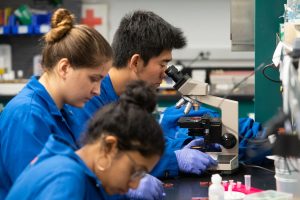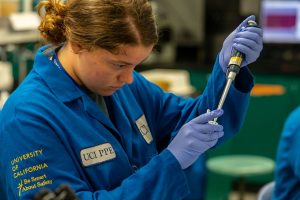Instructors:
Dr. Allon I. Hochbaum, Assistant Professor, UCI
Department of Chemical Engineering and Materials Science
Department of Chemistry
Dr. Elizabeth N. Bess, Assistant Professor, UCI
Department of Chemistry
Prerequisites: High School Chemistry
Course Description:
We live in a microbial world. Bacteria inhabit most niches on earth, from the sea floor to the high desert, and even in and on our bodies. For example, trillions of bacteria live in your gut. This community of microorganisms is called the gut microbiota, and it is a key indicator of good health. Discovering what makes these gut bacteria special is one of the fastest growing areas of scientific research, spanning areas of chemistry, biology, and methods in big data analysis. These discoveries are leading to new ways to stop disease by controlling which bacteria are in a person’s gut and what those bacteria do. The key to surviving in our gut, as in any niche, is the ability of bacteria to adapt to changing conditions. Changes in local conditions are considered stresses, from different food sources to nutrient deprivation to exposure to harsh conditions like heat or acid or salt and others. Bacteria have evolved methods of dealing with these changes through physiological changes within the cell, known as stress responses.
In this module we will focus on how gut bacteria respond to factors such as food and stress. You will learn to isolate and identify bacteria introduced into the gut microbiota via foods and to discover the functions of these bacteria. You will explore how diet shapes the behavior of gut bacteria, how they respond to stresses, and how their stress response can affect their resilience to other stresses, even imparting tolerance in these cells against antibiotics. Your projects will provide an opportunity to explore the interconnected nature of stress responses and the role of stresses in altering the behavior of bacteria, both good and bad.


